 Read almost any online computer site or magazine, and you’ll see a three-letter acronym being touted as a good thing for online security – VPN or Virtual Private Network. In this episode of our Network and Security Series, we’ll talk about some of the benefits and costs of using a VPN.
Read almost any online computer site or magazine, and you’ll see a three-letter acronym being touted as a good thing for online security – VPN or Virtual Private Network. In this episode of our Network and Security Series, we’ll talk about some of the benefits and costs of using a VPN.
If you’ve missed some of our other articles in the Network and Security Series, here’s a quick list of links to get you up to speed:
- All About DNS
- Wi-Fi Security Revealed
- What the New Wi-Fi 6 Standard Brings to Wireless Networking
- Zero Trust, a New Way to Look at Network Security
What is a VPN?
A simple way to describe a VPN is as an encrypted tunnel that routes data over the Internet between a device (a MacBook, an iPhone, an iPad Pro…) and a private network like those run by most businesses. By using a VPN to connect to a corporate network, the device user appears to be just another user on that network, with access to servers, printers, and services that are provided by the network.
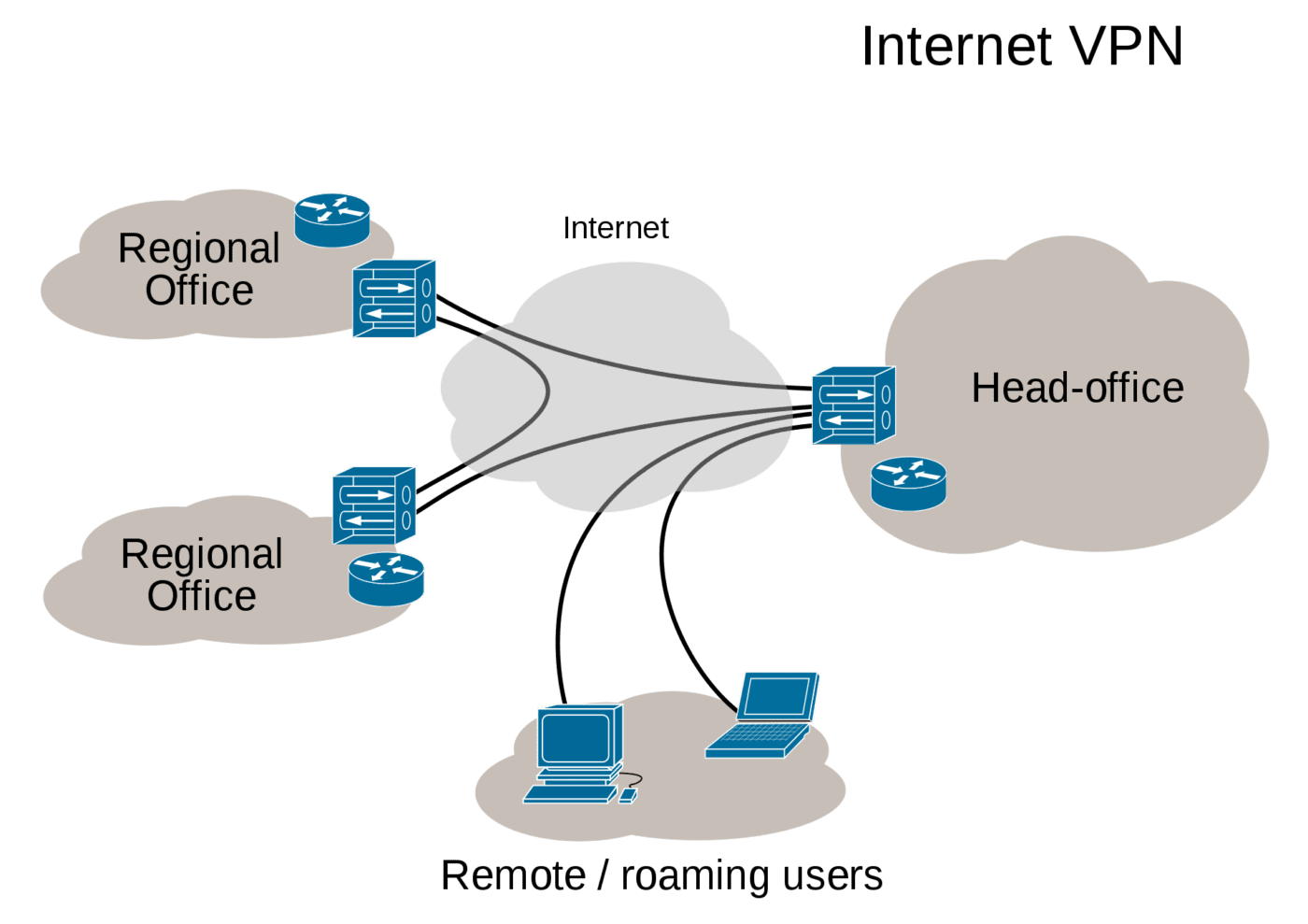
Originally, VPN technology was used by remote users and branch offices to access corporate applications and resources (see image above). VPNs are created by establishing a virtual point-to-point connection either using dedicated circuits (like from the regional office to head office) or with tunneling protocols over the Internet.
VPNs are still being used for corporate purposes, but for most casual users a virtual private network can supply an extra layer of security for Internet users (particularly on public Wi-Fi networks), additional privacy, and anonymity.
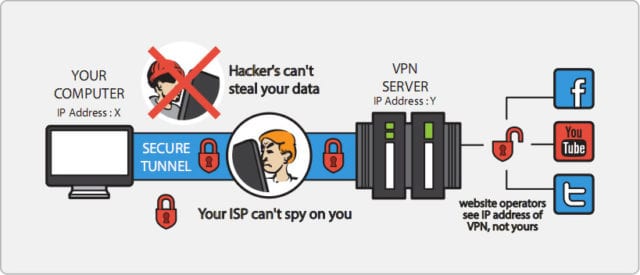
Advantages of a VPN
Encryption
Although the level of encryption provided by a VPN varies by provider, your data is safe from outside snooping thanks to it being encoded by various means. Regardless of where you’re browsing the web from – home, office or public Wi-Fi hotspot – encryption makes data streams unreadable by your internet service provider (ISP), hackers or government officials.
Bypassing Geoblocks
International travelers hoping to get access to video content while out of their home country can often be out of luck thanks to geoblocking. As an example, let’s say you’re visiting the USA from Britain and would like to stream your favorite shows. Without a VPN, the BBC will see that you’re attempting to access the streaming video from the US and you’ll be blocked.
VPNs allow you to change your IP address depending on the location of the VPN server, so our British friend can appear to the BBC to be connecting to the Internet from the UK, even though he’s actually lounging on a beach in Florida.
For those who are unfortunate enough to live in censorship-heavy countries that block websites in free countries, VPNs offer a way to bypass the censorship.
Save Money on Purchases
You know that ability to change your IP address we mentioned above? It can come in handy if you’re looking for ways to buy products, flights, or hotel rooms online.
E-commerce and travel websites often display different prices to shoppers from different countries. Booking a flight from the US to Asia, for example, might be less expensive if you access an Asian airline’s website from what appears to be Thailand instead of Tennessee.
If you wish to do exhaustive research on pricing, it’s best to find a VPN with servers in a large number of countries.
VPNs Provide Affordable Security
Premium VPN services can not only unblock websites around the world, but they keep your connection anonymous and encrypted. VPNs for iOS often have apps that are easy to configure and set up, and on Macs the connection can either be set up through an app, a website, or a simple network configuration.
There are even free VPN services available, but they’re often hamstrung by pop up ads, slow speeds, or a lack of security. In our next Network and Security Series post, we’ll provide a list of VPNs from free to “affordable” along with the top features of each.
Disadvantages of VPNs
So, you’re thinking that a VPN might be just the thing for you. Well, before you sign up for a service, make sure you know what negatives might ruin your day.
Slow Connection Speeds
Data encryption keeps your connection secure while using a VPN, but with some VPN providers that encryption can actually slow down your connection significantly. Particularly in situations where you wish to stream video, a slow connection can make you wish you had never signed up! Make sure that your VPN provider can offer high speeds without compromising your security.
Some VPN providers offer free trials of their services, and it’s a good idea to take the time to try out your specific use cases with more than one provider.
VPN Connections Can Drop and Reveal Your Real IP Address
Reliable VPN services don’t drop connections very often, but when it does happen, it can expose your real IP address and that coveted anonymity suddenly disappears.
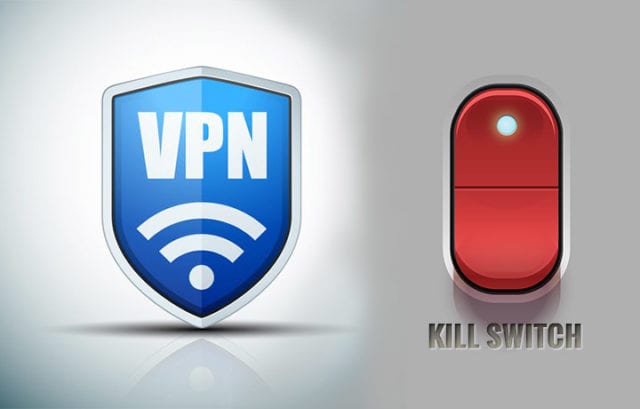
To protect you from the occasional connection glitch, you should make sure that your VPN provider offers a kill switch. A kill switch disconnects you instantly from the Internet if a server drops your connection, which prevents your IP address from being revealed.
VPN Blockers
Since streaming services don’t want those outside of their “service area” to be able to take advantage of their programming, they’ve been hard at work on VPN blockers. Netflix and Hulu are among the two big streaming services that work on blocking VPN users, taking away one of the big advantages of using a VPN while traveling.
However, some VPN providers keep up the good fight, making sure that their customers can get through VPN blockers.
Difficult Configuration
While configuring a device for VPN service can be drop-dead simple when you’re using an iOS app that just asks for your permission to install a config file, it can be much more difficult in cases where you’re asked to go through a manual process to connect.
If you’re not properly configured to connect to your VPN, you could experience IP and DNS “leaks” that make your private data vulnerable to online threats. To ensure that you have a good VPN experience, make sure that your VPN provider offers an easy and user-friendly connection process.
Do You Use a VPN?
I’m often asked this question when I extol the virtues of VPNs. While I don’t use a VPN to get around geoblocks, I do like the fact that they make my connection anonymous through encryption and by blocking my IP address. Whenever I’m on a public Wi-Fi network, I know that my browsing and any transactions I make are hidden from view of any potential hackers on the network. I currently use a free and simple-to-use VPN service that I’ll discuss in the next article.

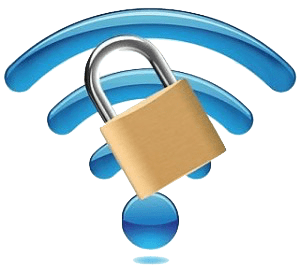
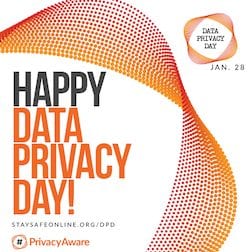
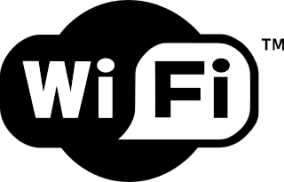

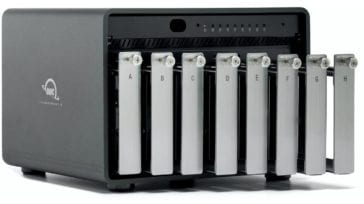



A virtual private network (VPN) is a technology that creates an encrypted connection over a less secure network. A remote control connection uses RDP protocol for establishing remote support connection. For VPN tools like Cisco VPN are used. For remote control and remote support connection. tools like logmein, R-HUB remote support servers, teamviewer, gosupportnow etc. are used.
Mention this article comparing VPN providers:
https://blog.macsales.com/48759-networking-and-security-series-popular-vpns-compared/
Be careful about what VPN service you trust your data to. That “VPN SERVER” in the above diagram gets to see all your network traffic.
There have been cases of ‘Black Hat’ outfits offering free VPN apps/services which were data harvesting outfits, they didn’t have to “sniff” anything, the trusting customers handed everything to them.
Remember, if you’re not paying for it you aren’t a customer you are a commodity.
I work in a printing company and have several coworkers that need to access fileservers and printers from their home offices.
We currently use Himachi to give them access. I have not been successful with setting up a in-house MacOS server to allow for VPN connection that will allow for remote network and printer access. Any ideas?
Does the best costs the most?
Typical net speed, slow to fast list
How good are Free VPNs? Pros and Cons.
How many devices are you allowed?
Multiple devices make connections slower?
Works with wired connections and WiFi connections.
Works with cable supplied systems? Such as TW or Comcast?
Great. An article about Firewalls (Little Snitch, etc) would be also useful.